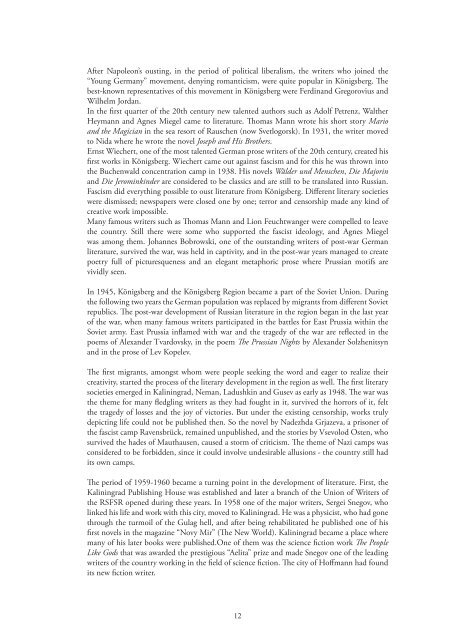BALTIC MEETINGS - Baltic Writers Council
BALTIC MEETINGS - Baltic Writers Council
BALTIC MEETINGS - Baltic Writers Council
You also want an ePaper? Increase the reach of your titles
YUMPU automatically turns print PDFs into web optimized ePapers that Google loves.
After Napoleon’s ousting, in the period of political liberalism, the writers who joined the<br />
“Young Germany” movement, denying romanticism, were quite popular in Königsberg. e<br />
best-known representatives of this movement in Königsberg were Ferdinand Gregorovius and<br />
Wilhelm Jordan.<br />
In the first quarter of the 20th century new talented authors such as Adolf Petrenz, Walther<br />
Heymann and Agnes Miegel came to literature. omas Mann wrote his short story Mario<br />
and the Magician in the sea resort of Rauschen (now Svetlogorsk). In 1931, the writer moved<br />
to Nida where he wrote the novel Joseph and His Brothers.<br />
Ernst Wiechert, one of the most talented German prose writers of the 20th century, created his<br />
first works in Königsberg. Wiechert came out against fascism and for this he was thrown into<br />
the Buchenwald concentration camp in 1938. His novels Wälder und Menschen, Die Majorin<br />
and Die Jerominkinder are considered to be classics and are still to be translated into Russian.<br />
Fascism did everything possible to oust literature from Königsberg. Different literary societies<br />
were dismissed; newspapers were closed one by one; terror and censorship made any kind of<br />
creative work impossible.<br />
Many famous writers such as omas Mann and Lion Feuchtwanger were compelled to leave<br />
the country. Still there were some who supported the fascist ideology, and Agnes Miegel<br />
was among them. Johannes Bobrowski, one of the outstanding writers of post-war German<br />
literature, survived the war, was held in captivity, and in the post-war years managed to create<br />
poetry full of picturesqueness and an elegant metaphoric prose where Prussian motifs are<br />
vividly seen.<br />
In 1945, Königsberg and the Königsberg Region became a part of the Soviet Union. During<br />
the following two years the German population was replaced by migrants from different Soviet<br />
republics. e post-war development of Russian literature in the region began in the last year<br />
of the war, when many famous writers participated in the battles for East Prussia within the<br />
Soviet army. East Prussia inflamed with war and the tragedy of the war are reflected in the<br />
poems of Alexander Tvardovsky, in the poem e Prussian Nights by Alexander Solzhenitsyn<br />
and in the prose of Lev Kopelev.<br />
e first migrants, amongst whom were people seeking the word and eager to realize their<br />
creativity, started the process of the literary development in the region as well. e first literary<br />
societies emerged in Kaliningrad, Neman, Ladushkin and Gusev as early as 1948. e war was<br />
the theme for many fledgling writers as they had fought in it, survived the horrors of it, felt<br />
the tragedy of losses and the joy of victories. But under the existing censorship, works truly<br />
depicting life could not be published then. So the novel by Nadezhda Grjazeva, a prisoner of<br />
the fascist camp Ravensbrück, remained unpublished, and the stories by Vsevolod Osten, who<br />
survived the hades of Mauthausen, caused a storm of criticism. e theme of Nazi camps was<br />
considered to be forbidden, since it could involve undesirable allusions - the country still had<br />
its own camps.<br />
e period of 1959-1960 became a turning point in the development of literature. First, the<br />
Kaliningrad Publishing House was established and later a branch of the Union of <strong>Writers</strong> of<br />
the RSFSR opened during these years. In 1958 one of the major writers, Sergei Snegov, who<br />
linked his life and work with this city, moved to Kaliningrad. He was a physicist, who had gone<br />
through the turmoil of the Gulag hell, and after being rehabilitated he published one of his<br />
first novels in the magazine “Novy Mir” (e New World). Kaliningrad became a place where<br />
many of his later books were published.One of them was the science fiction work e People<br />
Like Gods that was awarded the prestigious “Aelita” prize and made Snegov one of the leading<br />
writers of the country working in the field of science fiction. e city of Hoffmann had found<br />
its new fiction writer.<br />
12


